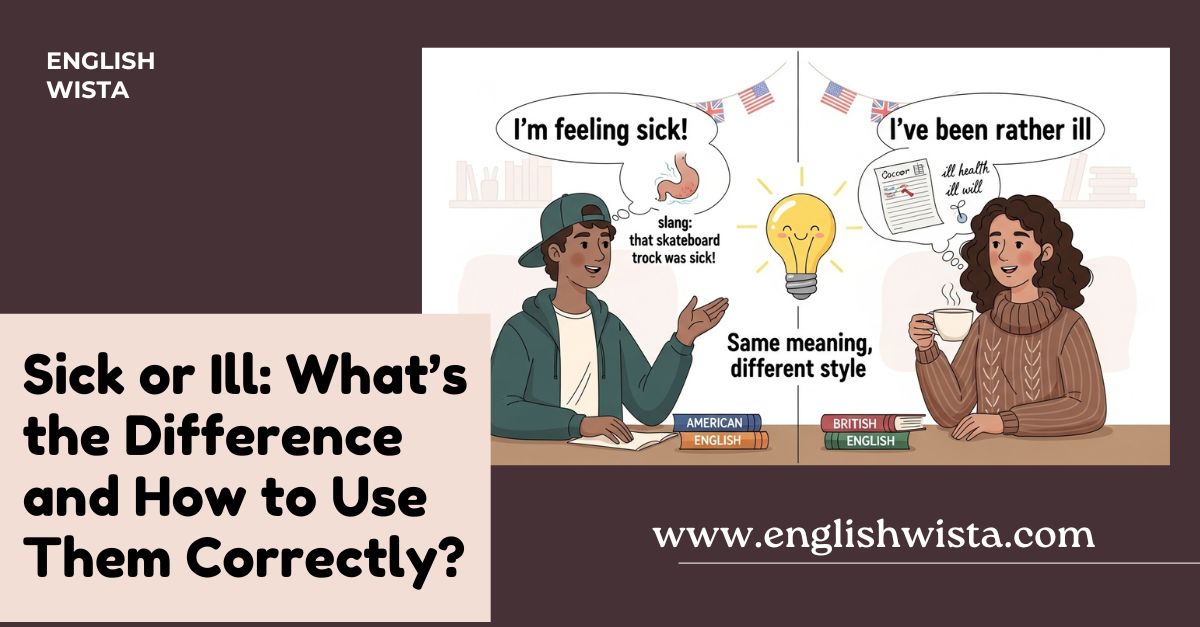Introduction: Let’s clear the confusion
Have you ever wondered if you should say “I feel sick” or “I feel ill”? You’re not alone. These two words often confuse English learners, and even native speakers sometimes use them differently depending on where they live. Both words are about health and not feeling well, but the way they are used can change depending on the country, the situation, or even the exact feeling you want to describe.
In this article, we’ll explore the differences between sick and ill in simple terms. We’ll look at how people use them in real life, share examples, and even explore some fun facts. By the end, you’ll feel confident about which word to use and when.
What Does “Sick” Mean?
The word sick is commonly used to describe someone who is not feeling well. In everyday conversation, especially in American English, people usually say “I’m sick” when they are unwell for any reason—whether it’s a headache, a cold, or even the flu.
But there’s more. In English, sick can also specifically mean feeling like you want to vomit. For example:
- “I feel sick after eating too much cake.”
So, depending on the context, sick can mean:
- General unwellness.
- Nausea or wanting to vomit.
Example sentences with “sick”:
- “I can’t come to work today. I’m sick.”
- “That rollercoaster made me feel sick.”
- “She stayed home because her child is sick.”
What Does “Ill” Mean?
The word ill also means “not well,” but it is often seen as slightly more formal or serious. In British English, ill is very common and often replaces sick. In American English, people use it less often in casual conversation.
Ill is usually connected to medical conditions, health problems, or more serious states of being unwell.
Example sentences with “ill”:
- “She has been ill for weeks.”
- “He looks ill. Maybe he should see a doctor.”
- “Many people fell ill during the winter.”
Notice how ill sounds a bit more formal than sick. You are more likely to read it in newspapers, hear it in official reports, or see it in writing.
Sick vs Ill: What’s the Difference?
Now, let’s compare them directly.
- Everyday use:
- In American English, sick is used more often in daily conversations.
- In British English, ill is more common.
- Seriousness:
- Sick can mean anything from a small stomach ache to a cold.
- Ill sometimes feels more serious, like a long-term or major health problem.
- Nausea vs general unwellness:
- Sick can specifically mean feeling like you need to vomit.
- Ill usually does not carry that meaning.
Is One Word More Correct Than the Other?
The good news is that both are correct, but the best choice depends on the situation and the audience.
- If you are in the United States, people usually say “sick.”
- If you are in the United Kingdom, “ill” might sound more natural.
Think of it as a regional preference. Both words will be understood no matter where you are.
Real-Life Examples: Sick vs Ill
Here are some side-by-side examples to make things clearer:
- American English:
- “I feel sick today.”
- “My little brother is sick with the flu.”
- British English:
- “I’ve been ill all week.”
- “She suddenly fell ill during the trip.”
- When talking about nausea:
- Correct: “The boat made me feel sick.”
- Not natural: “The boat made me feel ill.”
Other Uses of the Word “Sick”
Here’s where English gets fun! The word sick has extra meanings outside health.
- Sick as slang (especially among younger people):
- “That skateboard trick was sick!” (meaning amazing or cool).
- Sick of something:
- “I’m sick of doing homework.” (meaning tired or fed up).
- Sick leave:
- “He is on sick leave from work.” (official time off for health reasons).
Other Uses of the Word “Ill”
Ill also has a few special uses, usually in formal or literary contexts.
- Ill-timed or ill-prepared:
- “That joke was ill-timed.” (meaning badly timed).
- Ill will:
- “There was ill will between the two neighbors.” (meaning bad feelings or hostility).
- Fall ill:
- “Many villagers fell ill after the storm.” (a common phrase in British English).
Word Origins: Where Do They Come From?
Sometimes knowing the history of a word makes it easier to remember.
- Sick comes from Old English seoc, which meant “unwell, diseased, weak.” This word has been around for over a thousand years.
- Ill comes from Old Norse illr, which originally meant “bad” or “evil.” Over time, it changed to mean “unhealthy” or “not well.”
So, both words have ancient roots, but from different languages—Germanic and Norse.
Quick Tips to Remember the Difference
Here’s a simple way to keep it straight:
- Use sick when you’re speaking casually, especially in the U.S.
- Use ill when you want to sound more formal or if you’re in the U.K.
- Remember: sick can also mean nauseous, but ill cannot.
Fun Fact: “Sick” Can Be Positive Too!
Yes, it sounds strange, but in modern slang, especially among young people, sick can actually mean “awesome” or “amazing.”
For example:
- “That new song is sick!”
- “Your dance moves are sick!”
This is one of those funny quirks of English where the same word can mean the opposite depending on context.
Common Phrases with Sick and Ill
With “sick”:
- “Sick and tired” → “I’m sick and tired of waiting.”
- “Call in sick” → “She called in sick to work.”
- “Sick to death” → “He’s sick to death of the noise.”
With “ill”:
- “Take ill” → “The actor took ill during filming.”
- “Ill effects” → “The medicine had no ill effects.”
- “Ill health” → “She retired due to ill health.”
Practice Time: Which Word Would You Use?
Try to guess the right word:
- “I feel ___ after eating too much candy.”
- “She has been ___ for months and needs treatment.”
- “He called in ___ this morning.”
- “That movie was ___!” (slang, positive)
Answers:
- Sick
- Ill
- Sick
- Sick
Conclusion: Easy Takeaways
So, what have we learned? Both sick and ill talk about not feeling well, but they are used a little differently.
- In American English, sick is more common.
- In British English, ill is more natural.
- Sick can also mean nausea or even something “cool” in slang.
- Ill often feels more formal or serious, and it appears in set phrases like “ill health” or “ill will.”
The key takeaway is this: you can use either word, and people will understand you. But if you want to sound more natural, think about where you are and how formal the situation is.
Next time you’re not feeling well, you’ll know exactly whether to say “I’m sick” or “I’m ill.”



